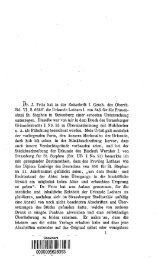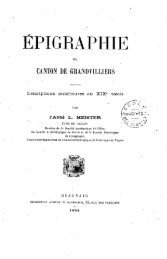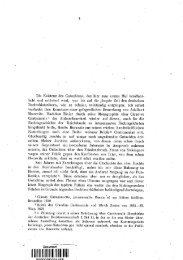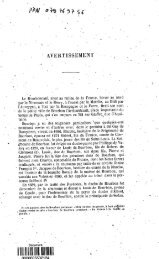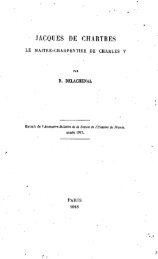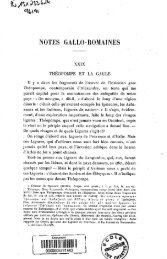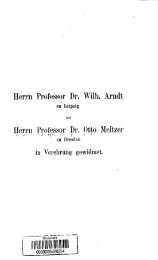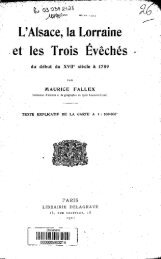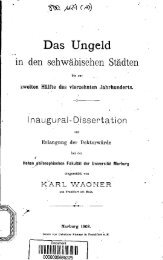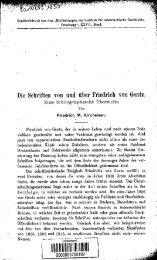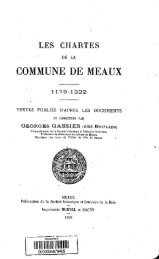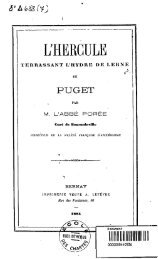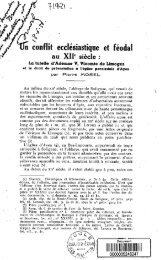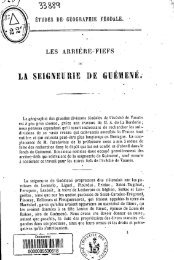4P Li gç(' TRANSACTIONS
4P Li gç(' TRANSACTIONS
4P Li gç(' TRANSACTIONS
Create successful ePaper yourself
Turn your PDF publications into a flip-book with our unique Google optimized e-Paper software.
VOL. 47, PT. 5, 1957) ORESME'S VERSION AND ENGLISH TRANSLATION 821<br />
T. Item, entre les gerres on manieres de sers ceulz<br />
stint tres bons qui tie sunt pas paoureus tie tres fors.<br />
Car les tins et les autres funt malvesement pource que<br />
ceulz qul stint tres paoureus tie pevent souffrir on sonstenir<br />
laheur ne peine et ceulz qui stint plains de ire et<br />
courageus tie obeissent pas bien.<br />
G. Ft donques ceulz qui sunt disposes moiennenleiit et<br />
tie stint pas fiebles ne trop doubtans labour tie trop fors ct<br />
trop fiers sunt bons pour estre serfs operatifs.<br />
T. Item, ii convient en tons on a tous mettre fin<br />
G. Cc est assavoir, en tous leur labeurs ou en toutes les<br />
choses dessus dictes mettle fin et mesure et a tous serfs.<br />
T. Car cc est chose juste et rnoderee que liberté soit<br />
mise leur merite on louicr on desserte; car adonques<br />
Veulent il labourer quant la deserte est determinee et le<br />
temps determine,<br />
G. Quant a cest propos iii. manieres de serfs stint. Car<br />
auctm est serf operateur et serf naturelment. Ft qui exposeroit<br />
ceste partie, dc tel serf liberté seroit prise pour<br />
repos // (336a) et recreation; car tel serf tie (bit pas avoir<br />
libertC proprement (licte, roes est expedient et juste chose<br />
qu'il serve. Si comme ii fu dit ou quint chapitre de Polltiqucs.<br />
Et dc cc dit Ic Sage; Servuni inclinant operaciones<br />
assidue. II doit assiduelment estre tenu en humilité et en<br />
operations serviles. Item, aucun est franc de nature et serf<br />
operatif par violence no par povreté ou par autre infortune;<br />
et a tel doit cstre donnee libcrté apres certain temps<br />
determine, si comnie il fu commandé as filz d'Israel en<br />
lAncien Testament: Si pauperitate conipulsus vendiderit se<br />
tibi frater tuus, etc. Item, si comme devant est dit, aucun<br />
est serf curateur Ott dispensateur et quant il est bon Fen<br />
lui doit a certain terme donner pleine liberté et tele merite<br />
quil puisse apres vivre cOmfliC seigneur (Ic maison. Ft<br />
pour cc dit Ic Sage: Servus sensatus sit tibi dilectus quasi<br />
anima tua. Non defraudes illuni libertate, neque inopem<br />
derelinquas ilIum. On lui doit donner liberté et non souffrir<br />
quil soit po\'. Ft ces enseignemens Aristote touche<br />
et proniet a dire apres en la fin du. xxii.° chapitre do. vii?<br />
de J'olitiqucs, jouxtc ce que fu dit on premier chapitre.<br />
6. On sixte chapitre ii met les parties fornteles d'yconontie<br />
et determine de .ii. d'icelles.<br />
T. Les especes ciue doit considerer celltii qui est yconome<br />
stint .iiii., lesquelles il convient avoir vers les<br />
choses dc la iiiaison. Car il convient estre puissant Ott<br />
avoir possibilité dc cluerir on aquerir. Item, ii convient<br />
que les cho- / (336b) ses soient gardees; car se cc ne<br />
estoit, le utilité de les aquerir seroit nulle. Item, qu'en<br />
dies ait aornement art ordcnance. Item, usage.<br />
G. Ce est a dire que Yen sache user des choses deuement<br />
T. Car pour grace et afin de cc avons notis mestier<br />
de elles.<br />
G. Cc est assavoir, pour user en deuement. Or avons<br />
donques .iiii. especes dc industrie qui sunt requises en gUnvernement<br />
dc maison. Ce est assavoir: aquisitive, conserva-<br />
T. Among the varieties or kinds of slaves, those who<br />
are neither fearful nor Very strong are excellent. For<br />
both the fearful and the overbold (10 badly, since the<br />
former cannot endure hard work or labor and those<br />
who are hot-headed and rash will not obey readily.<br />
G. But those of moderate disposition, neither weak nor<br />
afraid to work nor too Strong or too proud, make good<br />
laboring slaves.<br />
T. In all cases or for all slaves, one must set a goal.<br />
G. That is, one must set a fixed goal or term for the<br />
labor of all slaves.<br />
T. It is proper and just that freedom should be their<br />
reward or prize; for then they are willing to work when<br />
the recompense is fixed and the period of service predetermined.<br />
G. In this connection, there are three varieties of slaves.<br />
One type is the natural slave, the laborer; and in explaining<br />
this passage of the text, we should assume that liberty<br />
for him would be leisure // (336a) and recreation; for<br />
such a slave should not have liberty properly so called.<br />
But it is just and expedient that lie should work as a slave,<br />
as indicated in Politics I, 2 [1254b 19 if.]. And Solomon<br />
states: "Constant work makes anobedient servant" [Ecclicus<br />
33 271. He must he held assiduously to his task<br />
in humility and in servile labor. If he is of upright nature<br />
and has been forced to become a laborer through violence<br />
or front or some other misfortune, such a one<br />
should be given his freedom after a fixed period of time,<br />
as was commanded of the children of Israel in the Old<br />
Testament: "If thy brother shall sell himself to thee out of<br />
poverty, etc." [Lev. 25: 39]. As previously stated, certain<br />
slaves are caretakers or supervisors and if they are worthy,<br />
they should be given complete freedom after a certain<br />
length of time and should be so recompensed that they<br />
may afterward live as masters of their own house. Wherefore<br />
Solomon says: "A wise slave love as thyself and withhold<br />
not his freedom nor leave him go unrecoinpensed"<br />
[Ecclicus 7: 23]. He should be granted his freedom and<br />
not he permitted to remain poor. And Aristotle touches<br />
on these precepts and promises to speak about them again<br />
at the end of Politics VII, 9 [1330a 33], following that<br />
which was stated in the first chapter.<br />
6. in the sixth chapter he states the formal divisions of<br />
economics and discusses two of these especially.<br />
T. The head of a household should take into consideration<br />
four typical requirements connected with the<br />
business of managing his property: (1) he must have<br />
the capacity or the faculty for getting or acquiring; (2)<br />
the possessions / (336b) must he protected or preserved,<br />
otherwise it would be pointless to acquire them:<br />
(3) they must be improved and kept in order; (4) they<br />
must be of rise.<br />
G. That is, one must know how to use them to advantage.<br />
T. Because it is for the last-named purpose that we<br />
need these possessions.<br />
G. That is, in order to make proper use of them. Thus<br />
we have four types of activity essential to the governance<br />
of a household: (1) the acquisitive, (2) the preservative,



